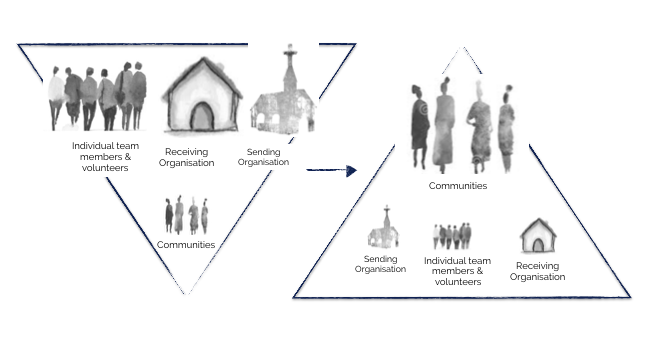Short-term missions is about participating in God's plan for the world.
It's grounded in the desire to share God's love and support and benefit communities overseas.
Good intentions, like the ones above, are a great starting point for short-term missions. However, if good intentions are to translate into good outcomes for all involved, its important to stop and consider the ethics of short-term missions.
Without this consideration, STM and volunteer trips often fail to contribute to lasting change and can actually cause unintended harm to the communities and people they aim to assist.
In this section of the website we will outline the four key considerations that make up the ethical framework and help you apply them to your short-term missions program or trip. By doing so, you'll be better positioned to identify and avoid the common pitfalls that lead to unintended harm.
ETHICAL CONSIDERATIONS
For any STM trip or volunteer placement to be ‘ethical’ the answer to all four of the considerations must be a resounding YES. It must be founded on the right principles, driven by the right motivation, outworked through the right method and purposed to achieve a good goal.
If any one of the four aspects of the ethics framework is not 'good' or 'right', then the practice is deemed unethical.
But there is one important question remaining-- 'good' and 'right' for who?
There is where it gets tricky. There is more than one person or group involved in a short-term missions trip or volunteer placement. So, when it comes to determining the 'good' of a short-term missions trip, whose perspective should we consider?
ACTORS IN A SHORT-TERM MISSIONS TRIP
Typically we assess the 'good' from our own vantage point, as a sending church, a receiving organisation or an individual volunteer. Whilst this is normal and understandable, it won't ensure our STM trips are ethical.
For STM to be ethical, the goal, motivation, method and principles applied must also be 'good' and 'right' for the least powerful person in the equation, which is often the local communities, particularly children, that teams interact with. If it is not found to be in their best interests, then STM becomes an outworking of privilege rather than a reflection of ethics.
Power, Privilege and STM
The fact that you can access this website and are considering travelling overseas on a STM trip indicates that you are in a position of relative power and privilege. This is shaped by a range of factors, many of which are outside of your control.
Power and privilege is not something we can separate ourselves from. We carry it with us where ever we go, including onto the mission field. When power and privilege is not acknowledged and counteracted in STM, the goals and motivations of STM teams or facilitating organisations can end up being prioritised over the goals and motivations of local communities. For example we may prioritise:
- What volunteers want to do - over what local communities actually require
- The lasting impression the program will leave on the team- over the sustainable impacts it will have in the lives of local people
- What will result in a 'feel good' experience for volunteers - over what will empower local actors
- What encourages more giving- over what enables real learning
Of course we want STM trips to be a good experience for teams and volunteers. This is not wrong, however this goal cannot be achieved at the expense of what's 'good' and 'right' for local communities. When it is, local communities become the 'means' of creating a positive experience for team, and STM trips become another expression of inequality rather than the demonstration of love and justice we desire them to be.
The Ethical Dilemma of STM
So, this is the ethical dilemma of STM; What is often most motivating for teams and volunteers- direct involvement in programs and direct contact with vulnerable people especially children- is often not in the best interests of local people and communities. In fact it can undermine long-term development processes and lead to harm.
If we are committed to ethical STM and the best interests of others, we need to recognise the dynamics of privilege and power and work hard to invert the hierarchy. We must be willing to subordinate team-centric motives and goals to the best interests of local communities. This will ensure that the 'good' of STM program holds true when assessed from the margins and is a true expression of ethics.
SUMMARY:
Good intentions do not automatically translate into good outcomes. It is for this reason we must recognise the hierarchy of power and privilege and carefully consider the ethics of overseas missions and volunteering.
The Motivation, Principles, Goal and Methods must ALL be good for EVERYONE. The overriding ethical consideration must be the best interests of local communities and families.




